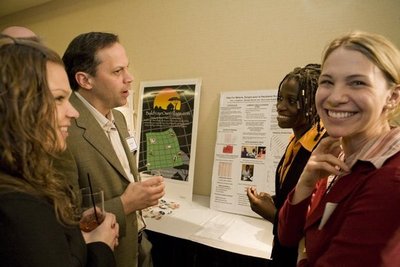September 8, 2010
UW to Host Largest University-Based Global Health Conference Sept. 19-21
More than 800 people will gather for the Consortium of Universities for Global Health (CUGH) annual conference being held at the University of Washington in Seattle on September 19-21 to discuss the critical role of universities in global health. The conference is the largest university-based global health conference ever held.
Participants from all of the major university-based global health programs in North America and Britain, and many leaders from universities in Africa, Asia, Latin America, the Caribbean will join global health leaders to discuss scientific advances, educational innovations and the infrastructure required to support academic global health programs. Topics include the impact of climate change on human health, global health policy and diplomacy, detection and control of infections from animals, innovative technologies, injury and violence prevention (including burn-related injuries to women, i.e.,”bride burning”), and women and children’s health.
“The Consortium is becoming a wonderful collaboration to bring the innovation and energy of universities into global health,” said King Holmes, MD, PhD, chair of Global Health at the University of Washington. “The University of Washington is honored to be hosting the second annual CUGH conference.”
The theme of the 2010 CUGH annual meeting is “Transforming Global Health: The Interdisciplinary Power of Universities” and will look at the tremendous contributions that universities can and must make to expand the science base through interdisciplinary efforts in research, education and training, and service programs.
“This is an unprecedented time in global health — a time in which idealism, innovation and passion across generations, coupled with surging resources, have redefined what is possible and created a new vision of a world not fractured by health disparities,” said Judith Wasserheit, MD, MPH, vice chair of Global Health at the University of Washington.
More than 40 partners from around the world will be attending the meeting, underscoring the crucial importance of international collaborations to the global health movement at universities.
“Through partnerships between U.S. academic institutions and those in the developing world, we are making research discoveries that improve human health, training the next generation of global health leaders and extending the frontiers of science,” said Roger I. Glass, MD, PhD, director of the Fogarty International Center of the National Institute of Health.
Glass is among the more than 100 distinguished speakers at the conference, several of whom play key roles in the President’s Global Health Initiative — the $63 billion investment by the United States over six years to help partner countries improve health outcomes through strengthened health systems. Other speakers involved in this effort include Nils Daulaire, director of the Office of Global Health Affairs at Health & Human Services; Kevin DeCock, director of the Center for Global Health at the Centers for Disease Control and Prevention; and Margaret Hamburg, commissioner with the U.S. Food and Drug Administration.
Heads of major research universities with leading global health programs, such as Mark Emmert, president of UW, and Susan Desmond-Hellmann, chancellor of UC San Francisco, will be on a panel discussing “the role of universities in global health.” They will be joined by Tachi Yamada, president of the Global Health Program with The Bill & Melinda Gates Foundation, as well as Jean Pape from Haiti, who was recognized by former U.N. Secretary General Kofi Anan in a ceremony honoring “heroes whose actions and courage make the world a better place.”
Prominent speakers from Europe, Africa, Asia and Latin America will discuss emerging university global health consortia, including: Sir Andrew Haines, director of the London School of Hygiene & Tropical Medicine in England; Nelson Sewankambo, dean and professor of Medicine at Makerere University College of Health Sciences in Uganda; Srinath Reddy, president of the Public Health Foundation of India, and Esteban Chaves Olarte, associate professor at University of Costa Rica.
A session on Journalism, New Media and Global Health, with NPR contributor and artist-in-residence with the UW Department of Communication Joanne Silberner, will take place on Tuesday.
This year’s meeting will have an “Educational Innovations” track that will enable the sharing of best practices between academic institutions. Global health education and training programs are rapidly increasing across the country, as reported at last year’s CUGH annual meeting. Today’s students have a growing interest in relieving health disparities around the world and are seeking training that will enable them to pursue careers in the burgeoning field of global health.
“Where I’m from, people still die from diseases that have had solutions for decades in the United States,” said Meheret Endeshaw from Ethiopia, an incoming masters of public health student at UW. “This observation sparked my interest of what can be done to bridge this gap. The CUGH conference will be a great opportunity to explore topics and make connections with people working abroad. It’s a great way to begin my formal training in public health.”
##
The mission of the CUGH is to build collaborations and exchange of knowledge and experience among interdisciplinary university global health programs working across education, research and service. It is dedicated to creating equity and reducing health disparities, everywhere.
For more information on the CUGH and the September 19-21 meeting, visit the Consortium of Universities for Global Health website. The conference will be using live webcasts, blogging, Twitter (#cugh10) and videos to disseminate information from the conference.
Press passes are available upon request. Please contact Paula Murphy at MurphyP2@globalhealth.ucsf.edu.

